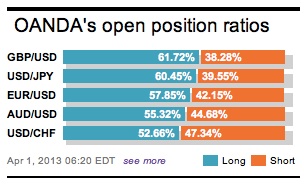There are no real surprises on this Easter Monday with global sentiment still very risk-off. Asian markets were lower on light volume on their first trading day of the new fiscal year. While in Europe, markets continue to hold above support amid holiday weariness – however, none of this is preventing global bad news from continuing to pile up.
In Japan, the market traded heavy following a slightly below-view on the manufacturers index in the BoJ Tankan survey. The survey revealed less pessimism over business conditions to the end of last month, March, due to the fallout of Abenomics. However, investors remain single-mindedly focused on the BoJ policy meet this week. Expectations for aggressive easing by new Bank of Japan Governor Kuroda are high due to the banks +2% inflation target.

Will Kuroda disappoint the market first time out? Any disappointment and this market will want to take back more of their aggressive short Yen positions accumulated sine Prime Minister Abe first stepped onto the scene last September/October. Overnight, the Yen has managed to strengthen outright and against the EUR amid the disappointing Tankan result and slightly weaker than expected manufacturing data out of China (50.9). Investors have been happily locking in more profits rather than fresh buys in front of Wednesday’s policy meeting.
This week, overall market direction should be determined by ongoing developments in the Euro-zone periphery, US macroeconomic data and central bank announcements in Europe (BoE and ECB), Japan (BoJ) and Australia (RBA). The ‘big’ dollar will be expected to benefit from safe-haven status (North Korea) and advantageous capital flow given more constructive US economic growth prospects.
In the US, the star data attraction will be this Friday’s payroll report where the market is expecting another strong print, proof that the US labor market continues to stabilize – Bernanke and company’s new single focus. Elsewhere, the 17-member single currency should remain under pressure with all things remaining equal.
The dynamics for the EUR and the Euro-zone have not changed over the past holiday weekend. Weakening growth and inflation expectations for the Euro-zone as a whole should support ECB’s Draghi in becoming more dovish. Reports that even the Emerging Markets are adjusting their reserves by dumping EUR’s will not help the currency stronger values cause. An IMF report released on Saturday indicated that Emerging Markets (EM) Central Banks sold –EUR45b last year, cutting their EUR holdings by -8%. Only +24% of Emerging Markets reserves is in EUR’s, lowest since the 2002 peak of +31%. On the other hand, their ‘big’ dollar holdings remain steady around +60%. Most of the Central Banks are now eyeing the interest and commodity sensitive currencies; sometimes know as Tier II reserve currencies –the AUD and CAD. The less liquid Euro-zone debt markets, due to their ongoing crisis, is also aiding to dampen their EUR diversification.

Across the channel to London, the “old Lady” or the BoE is unlikely to increase QE anytime soon. Policy makers will most likely wait for the arrival of the ‘chosen one’, ex-BoC governor Carney. The majority of the MPC will most likely keep a cautious stance with respect to more aggressive policy action as long as inflation expectations remain elevated – this will probably limit sterling’s downside slide this week.
The lack of any agreement of a government in Italy along with post-Cyprus concerns remains foremost in investor’s minds. The past holiday weekend was mostly free of market moving headlines and this should continue throughout today. In overnight action, the EUR was initially pushed lower, to test its 14-week low around 1.2770, on indicators that deposits in the two most talked about Cypriot banks, greater than +EUR100k, would sustain much larger losses (+60% haircut).

Today, and with most of Europe on holiday, the calendar is light apart from US ISM manufacturing survey. Market bids remain ahead of 1.2750 and 1.2700 – not surprisingly, both levels are associated with options – with stops below both. Near term the techies are eyeing 1.2660 as their medium term objective and last mid-November’s low. On the topside, the market still prefers to let some EUR’s go.

Other Links:
If Depositors Run, Where Will The EURO Hide?
This article is for general information purposes only. It is not investment advice or a solution to buy or sell securities. Opinions are the authors; not necessarily that of OANDA Corporation or any of its affiliates, subsidiaries, officers or directors. Leveraged trading is high risk and not suitable for all. You could lose all of your deposited funds.


